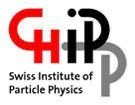Swiss physicists in dialog with the society
Swiss physicists want to make their fascinating research understandable to the interested public and to debate its meaning for our society together with representatives of other fields. They initiated in 2013 the project 'Interactions' in this perspective. The project directed by the physicist PD Dr. Hans Peter Beck from Bern is an initiative of the Swiss Institute of Particle Physics (CHIPP). The outreach portal was funded by the Swiss National Science Foundation (SNSF) with the Agora project 'Interactions' based on the former project called 'Das verflixtes Higgs' (2012-2013), which was supported by the SERI. In 2016, the portal begins a second life with its migration on a portal of the Swiss Academy of Sciences (SCNAT) dedicated to particle physics. The text below describes the origin of the current site.
Document: A look back at the Agora project "Interactions" (2013-2015)
With the discovery of the Higgs particle, the CERN's particle physicists have celebrated a spectacular achievement in July 2012. The discovery had a huge impact in the media with 150'000 media reports globally reaching over one billion people. Many other research activities falling into the four branches of particle physics – high energy physics, neutrino physics, low energy physics and astroparticle physics – made less noise in the public opinion, but are almost as important towards a better understanding of our world. Furthermore, particle physics is not only of relevance for pure fundamental research, but is also at the forefront of new applications in industry, medicine, and the daily life.
Explanations, news, Social Media
With 'Interactions', particle physicists wanted to make their work understandable for the community and present the research novelties at a higher level, yet accessible to everyone. This was and is still the goal of the webpage 'particlephysics.ch', which provides information and news about the whole spectrum of particle physics. The website is also accessible in German (teilchenphysik.ch), French (physiquedesparticules.ch) and Italian (fisicadelleparticelle.ch). It contains many video interviews with researchers and technicians, each providing a personal point of view on particle physics and related professions. The presence in four social media (Google+, Facebook, Youtube, Twitter) gives additional visibility to the project online. With the end of the SNSF-Agora funding in 2015, the social media activity had to be reduced, but this loss is compensated by the new location on the SCNAT web portal offering us a better visibility among other fields of natural sciences.
Online and offline discussions
With the project 'Interactions', Swiss particle physicists wanted to share their experience of research with a wide public, in an active dialog going beyond the borders of their own field. The core of the project consisted of interdisciplinary discussions, in which particle physicists deliberate about the importance of their discipline for the economy, culture and the image of our society. In each discussion event, one particle physicist started a dialogue with a scientist from another field, or for instance with a representative of the economy, a person engaged in the cultural sector or a politician. The particularity: the participants did not only discuss on the stage, but reached out to a new, younger audience through online debates (Google-Hangouts).
With the support of the Swiss particle physics
'Interactions' was initiated by the physicist Hans Peter Beck, lecturer at the University of Bern and since many years an important character in the European laboratory for particle physics (CERN) in Geneva. Beck played a leading role in the conception and setting of the ATLAS experiment as well as in the analysis of the data subsequently collected, which led in the summer of 2012 to the discovery of the Higgs particle. Beck brought 'Interactions' to life together with the social media expert Christine Plass and with Dr. Benedikt Vogel, a professional in research communication.
Behind the project stands the Swiss Institute of Particle Physics (CHIPP), the organisation comprehending all Swiss particle physics institutes (EPF Lausanne, ETH Zürich, Paul Scherrer Institut/PSI, University of Basel, University of Bern, University of Geneva, University of Fribourg, University of Zürich) with about 500 members altogether. The former CHIPP chair, Prof. Klaus Kirch (PSI, ETHZ), supported the 'Interactions' project as co-applicant.




